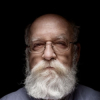Daniel Dennett

Daniel Dennett
Daniel Clement Dennett III is an American philosopher, writer, and cognitive scientist whose research centers on the philosophy of mind, philosophy of science, and philosophy of biology, particularly as those fields relate to evolutionary biology and cognitive science...
ProfessionPhilosopher
Date of Birth28 March 1942
beauty attitude humble
If you can approach the world's complexities, both its glories and its horrors, with an attitude of humble curiosity, acknowledging that however deeply you have seen, you have only scratched the surface, you will find worlds within worlds, beauties you could not heretofore imagine, and your own mundane preoccupations will shrink to proper size, not all that important in the greater scheme of things.
answers philosopher scientist
I am a philosopher, not a scientist, and we philosophers are better at questions than answers.
lasts mystery consciousness
Human consciousness is just about the last surviving mystery.
eye intelligent historical
Moreover, the eye contains a big flaw: the retina is inside out. Why would an almighty designer do such a thing? No intelligent designer, .. would put such a clumsy arrangement in a camcorder, and this is just one of the hundreds of accidents frozen in evolutionary history that confirm the mindlessness of the historical process.
growing-up children scary
We need to let our children grow up to face the world armed with knowledge, with much more knowledge than we ourselves had at their age. It is scary, but the alternative is worse.
stars believe sky
The kindly God who lovingly fashioned each and every one of us and sprinkled the sky with shining stars for our delight - that God is, like Santa Claus, a myth of childhood, not anything [that] a sane, undeluded adult could literally believe in. That God must either be turned into a symbol for something less concrete or abandoned altogether.
technology understanding pace
Thanks to technology, what almost anybody can do has been multiplied a thousandfold, and our moral understanding about what we ought to do hasn't kept pace.
answers alternatives economics
The only answer to the endless chains of why, why, why is that the alternatives died
atheist religion president
We have had plenty of atheist presidents; they just wouldn't admit it.
atheist art looks
I look around the world and see so many wonderful things that I love and enjoy and benefit from, whether it's art or music or clothing or food and all the rest. And I'd like to add a little to that goodness.
mistake opportunity practice
Try to acquire the weird practice of savoring your mistakes, delighting in uncovering the strange quirks that led you astray. Then, when you have sucked out all the goodness to be gained from having made them, you can cheerfully forget them and go on to the next big opportunity.
caring best-effort society
The only meaning of life worth caring about is one that can withstand our best efforts to examine it.
hurt winning opportunity
It's a no win situation. It's a mug's game. The religions have contrived to make it impossible to disagree with them critically without being rude. They play the hurt feelings card at every opportunity.
love-is giving suffering
Love is blind, as they say, and because love is blind, it often leads to tragedy: to conflicts in which one love is pitted against another love, and something has to give, with suffering guaranteed in any resolution.